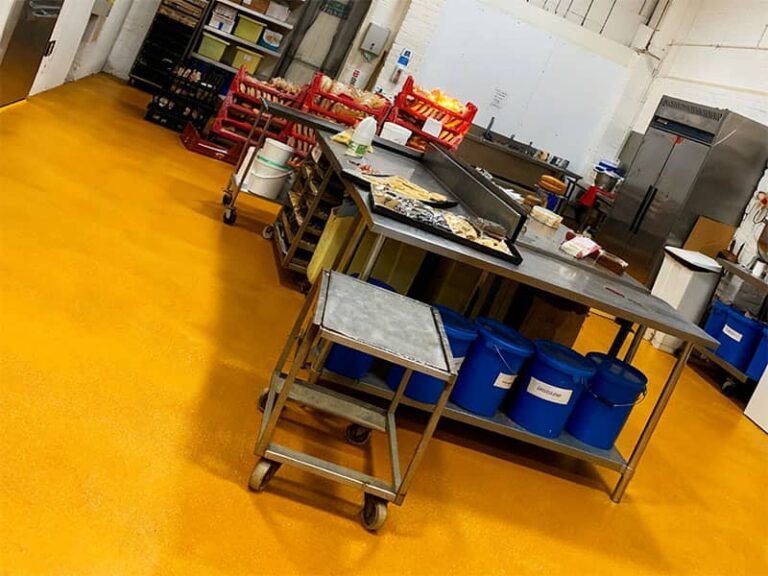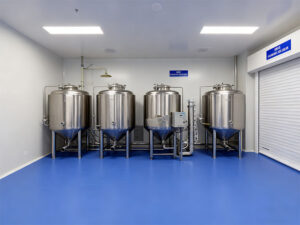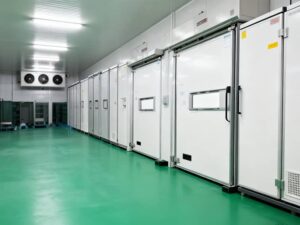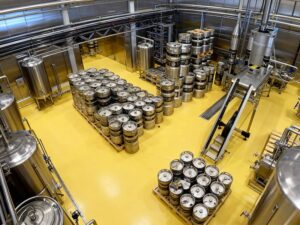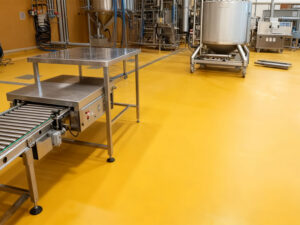For high-temperature kitchens and bakeries, the recommended flooring options are non-porous, heat-resistant, and durable materials such as porcelain tile, quarry tile, and certain industrial-grade epoxy systems. These materials are chosen for their ability to withstand direct heat from ovens, hot spills, thermal shock, and heavy foot traffic while ensuring safety and ease of maintenance. This guide will provide a detailed comparison of the top materials, their properties, installation considerations, and how to select the best one for your specific commercial or home bakery environment.
1. Why Heat Resistance is Non-Negotiable in Kitchen Flooring
The floor in a high-temperature kitchen is a critical piece of equipment in itself. It must endure a unique set of stresses that ordinary flooring cannot.
- Termisk chock: Sudden temperature changes, like a pot of boiling water spilling on a cool surface, can cause materials like standard vinyl or low-quality tile to crack or warp.
- Direct Heat: Dropped hot coals, proximity to pizza ovens, and radiant heat from industrial equipment require a material with a high thermal stability rating.
- Hygiene and Cleanability: Grease, oil, and food spills are constant. A non-porous surface prevents bacterial growth and allows for easy, thorough cleaning, which is a requirement for health code compliance.
2. Top 5 Recommended Flooring Types for High Heat
After evaluating materials based on heat tolerance, durability, slip resistance, and maintenance, five options consistently rank highest for kitchens and bakeries.
2.1 Porcelain Tile: The Durable and Versatile Champion
Porcelain tile is a densely pressed, kiln-fired ceramic tile that is exceptionally hard and non-porous. Its low water absorption rate (typically less than 0.5%, as per ASTM C373 standards) makes it highly resistant to stains, moisture, and thermal shock.
- Heat Resistance: Excellent. Can withstand very high temperatures without damage, making it safe near ovens and grills.
- Bäst för: Any high-traffic commercial kitchen or bakery where a balance of aesthetics, durability, and hygiene is required.
- Key Considerations:
- Choose through-body porcelain for areas with heavy wear, as the color runs throughout the tile.
- A textured or matte finish is crucial for slip resistance, especially in wet areas.
- Requires professional installation with the correct mortar and grout to prevent cracking.
2.2 Quarry Tile: The Classic, Grip-Tested Workhorse
Quarry tile is an unglazed, natural clay tile known for its rustic appearance and exceptional slip resistance. Its naturally gritty texture provides traction even when wet or oily.
- Heat Resistance: Excellent. Its composition is similar to brick, allowing it to handle extreme heat without issue.
- Bäst för: Bakeries, pizzerias, and behind-the-counter areas where slip resistance is a primary concern.
- Key Considerations:
- It is porous and must be sealed properly to resist stains and moisture.
- The classic red hue is common, but it comes in a range of earth tones.
- The hard surface can be tough on legs and feet during long shifts, so anti-fatigue mats are recommended.
2.3 Industrial Epoxy Flooring: The Seamless and Chemical-Resistant Solution
Epoxy flooring is a resin-based system applied as a liquid that cures to form a hard, seamless, and impermeable surface. Industrial-grade formulations are designed for extreme conditions.
- Heat Resistance: Good to Very Good. High-performance epoxy systems can withstand temperatures up to 200°F (93°C) continuously and higher for short-term spikes, according to data from the American Society of Concrete Contractors.
- Bäst för: Kitchens with heavy chemical use (cleaners, sanitizers) and where a completely seamless, joint-free surface is desired for hygiene.
- Key Considerations:
- Must be professionally installed on a perfectly sound and dry subfloor to prevent bubbling or peeling.
- Can become slippery when wet unless an aggregate additive is mixed in for texture.
- Offers excellent impact resistance but can be damaged by sharp, heavy objects.
2.4 Cementitious Topping (Topping)Urethane: The Heavy-Duty Performer
This is a two-part system involving a cement-based underlayment topped with a durable urethane coating. It is extremely resistant to thermal shock, impacts, and abrasion.
- Heat Resistance: Excellent for thermal shock. It can handle rapid temperature changes from ice spills to hot water without cracking.
- Bäst för: Breweries, dairy processing, and commercial bakeries where thermal shock and heavy physical abuse are daily occurrences.
- Key Considerations:
- One of the more expensive options and requires highly skilled installation.
- The urethane top coat provides a seamless, chemical-resistant, and easy-to-clean finish.
2.5 Natural Stone (Granite/Slate): The Premium, Heat-Resistant Choice
Certain natural stones like granite and slate are naturally hard, dense, and heat-resistant. They offer a unique, high-end aesthetic.
- Heat Resistance: Excellent. Granite, formed from molten magma, is inherently heatproof.
- Bäst för: High-end restaurants or open kitchens where aesthetics are a priority.
- Key Considerations:
- Must be sealed properly and periodically, as it is a porous material.
- Can be very expensive and slippery if polished. A honed or flamed finish is safer.
- Hardness can make it uncomfortable to stand on for long periods.
3. Critical Performance Factors Beyond Heat
Choosing the best floor for a hot kitchen involves balancing multiple factors. Heat resistance is just the starting point.
3.1 Slip Resistance: A Non-Negotiable Safety Feature
A wet or greasy kitchen floor is a major hazard. Slip resistance is measured by the Coefficient of Friction (COF). For commercial kitchens, a dynamic COF of 0.42 or higher is recommended by the Americans with Disabilities Act (ADA) for level surfaces, and many safety experts suggest aiming for even higher.
- How to Achieve It: Select quarry tile, textured porcelain, or epoxy floors with anti-slip additives.
3.2 Cleanability and Hygiene
A floor must be easy to clean to meet health codes. Non-porous surfaces like glazed porcelain, epoxy, and properly sealed quarry tile prevent moisture and bacteria from penetrating, allowing for simple mopping and sanitizing.
3.3 Durability and Maintenance
Commercial flooring must withstand heavy traffic, impacts from dropped utensils, and chemical exposure from cleaners. The following table compares the key attributes of the top materials.
Comparative Analysis of High-Temperature Kitchen Flooring
| Flooring Type | Heat Resistance | Halkmotstånd | Hållbarhet | Maintenance Level | Relative Cost |
|---|---|---|---|---|---|
| Porcelain Tile | Utmärkt | Good (with texture) | Utmärkt | Låg | Medium |
| Quarry Tile | Utmärkt | Utmärkt | Utmärkt | Medium (requires sealing) | Medium |
| Industrial Epoxy | Good to Very Good | Good (with additives) | Utmärkt | Very Low | Medium to High |
| Cementitious Urethane | Excellent (for thermal shock) | Good | Outstanding | Very Low | Hög |
| Natural Stone | Utmärkt | Fair to Good (with honed finish) | Good (can chip) | Medium (requires sealing) | Hög |
4. Frequently Asked Questions (FAQ)
Q: Can I use vinyl plank flooring in a high-temperature kitchen?
A: It is not recommended. Luxury Vinyl Plank (LVP) can be damaged by high heat and thermal shock. A hot pan or prolonged exposure to heat from an appliance can cause permanent indentation, warping, or melting of the material.
Q: What is the most cost-effective heat-resistant flooring?
A: For a balance of performance and cost, quarry tile is often the most cost-effective durable option. While the initial material cost of porcelain may be similar, quarry tile’s inherent slip resistance can make it a safer, more practical choice without added expense.
Q: How important is professional installation?
A: Critical. Improper installation is the leading cause of flooring failure in commercial settings. An experienced installer will ensure the correct subfloor preparation, mortars, grouts, and sealants are used, guaranteeing the floor performs to its specifications.
Selecting the right high-temperature kitchen flooring is a strategic decision that impacts safety, hygiene, and long-term operational costs. The top contenders—porcelain tile, quarry tile, and industrial epoxy—each offer a compelling blend of heat resistance, durability, and safety features. Your final choice should be guided by a careful evaluation of your specific heat exposure, slip resistance requirements, budget, and maintenance capabilities. By investing in the correct material and professional installation, you create a solid foundation for a safe, efficient, and compliant kitchen or bakery environment.
Upgrade Your Commercial Space with KAIDA PAINT’s Advanced Flooring Solutions
Navigating the complex demands of a high-temperature kitchen or bakery requires more than just an off-the-shelf product; it requires a scientifically formulated solution. At KAIDA PAINT, we specialize in developing and supplying high-performance flooring materials engineered specifically for the most challenging commercial environments. Our heat-resistant epoxy flooring systems are a testament to this commitment, formulated with advanced polymer technology to deliver unmatched thermal stability, chemical resistance, and mechanical durability.
Unlike standard options, our floors are designed to withstand not just heat, but the daily barrage of impacts, grease, and steam, all while maintaining a seamless, non-porous, and easy-to-clean surface. We provide comprehensive technical data sheets and performance metrics, empowering you to make an informed decision based on facts, not just claims.
